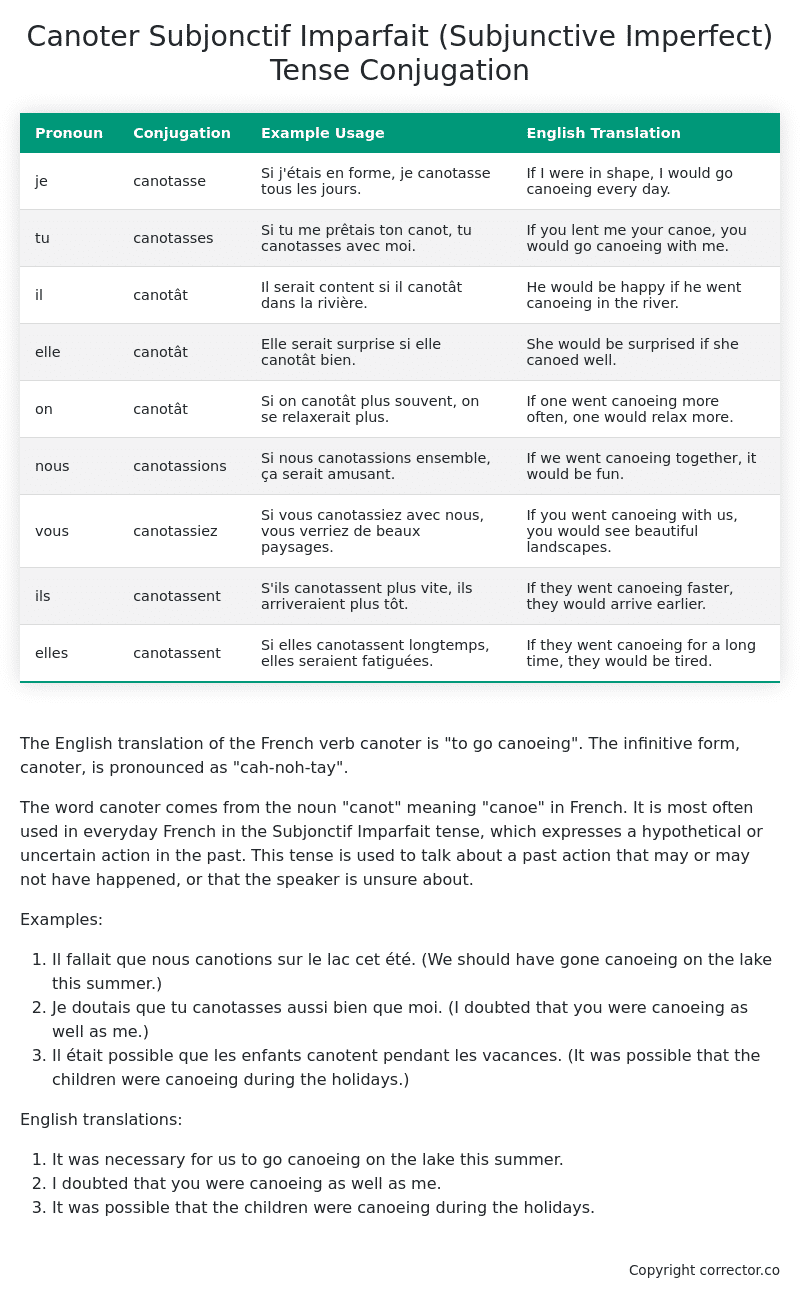Subjonctif Imparfait (Subjunctive Imperfect) Tense Conjugation of the French Verb canoter
Introduction to the verb canoter
The English translation of the French verb canoter is “to go canoeing”. The infinitive form, canoter, is pronounced as “cah-noh-tay”.
The word canoter comes from the noun “canot” meaning “canoe” in French. It is most often used in everyday French in the Subjonctif Imparfait tense, which expresses a hypothetical or uncertain action in the past. This tense is used to talk about a past action that may or may not have happened, or that the speaker is unsure about.
Examples:
- Il fallait que nous canotions sur le lac cet été. (We should have gone canoeing on the lake this summer.)
- Je doutais que tu canotasses aussi bien que moi. (I doubted that you were canoeing as well as me.)
- Il était possible que les enfants canotent pendant les vacances. (It was possible that the children were canoeing during the holidays.)
English translations:
- It was necessary for us to go canoeing on the lake this summer.
- I doubted that you were canoeing as well as me.
- It was possible that the children were canoeing during the holidays.
Table of the Subjonctif Imparfait (Subjunctive Imperfect) Tense Conjugation of canoter
| Pronoun | Conjugation | Example Usage | English Translation |
|---|---|---|---|
| je | canotasse | Si j’étais en forme, je canotasse tous les jours. | If I were in shape, I would go canoeing every day. |
| tu | canotasses | Si tu me prêtais ton canot, tu canotasses avec moi. | If you lent me your canoe, you would go canoeing with me. |
| il | canotât | Il serait content si il canotât dans la rivière. | He would be happy if he went canoeing in the river. |
| elle | canotât | Elle serait surprise si elle canotât bien. | She would be surprised if she canoed well. |
| on | canotât | Si on canotât plus souvent, on se relaxerait plus. | If one went canoeing more often, one would relax more. |
| nous | canotassions | Si nous canotassions ensemble, ça serait amusant. | If we went canoeing together, it would be fun. |
| vous | canotassiez | Si vous canotassiez avec nous, vous verriez de beaux paysages. | If you went canoeing with us, you would see beautiful landscapes. |
| ils | canotassent | S’ils canotassent plus vite, ils arriveraient plus tôt. | If they went canoeing faster, they would arrive earlier. |
| elles | canotassent | Si elles canotassent longtemps, elles seraient fatiguées. | If they went canoeing for a long time, they would be tired. |
Other Conjugations for Canoter.
Le Present (Present Tense) Conjugation of the French Verb canoter
Imparfait (Imperfect) Tense Conjugation of the French Verb canoter
Passé Simple (Simple Past) Tense Conjugation of the French Verb canoter
Passé Composé (Present Perfect) Tense Conjugation of the French Verb canoter
Futur Simple (Simple Future) Tense Conjugation of the French Verb canoter
Futur Proche (Near Future) Tense Conjugation of the French Verb canoter
Plus-que-parfait (Pluperfect) Tense Conjugation of the French Verb canoter
Passé Antérieur (Past Anterior) Tense Conjugation of the French Verb canoter
Futur Antérieur (Future Anterior) Tense Conjugation of the French Verb canoter
Subjonctif Présent (Subjunctive Present) Tense Conjugation of the French Verb canoter
Subjonctif Passé (Subjunctive Past) Tense Conjugation of the French Verb canoter
Subjonctif Imparfait (Subjunctive Imperfect) Tense Conjugation of the French Verb canoter (this article)
Subjonctif Plus-que-parfait (Subjunctive Pluperfect) Tense Conjugation of the French Verb canoter
Conditionnel Présent (Conditional Present) Tense Conjugation of the French Verb canoter
Conditionnel Passé (Conditional Past) Tense Conjugation of the French Verb canoter
L’impératif Présent (Imperative Present) Tense Conjugation of the French Verb canoter
L’infinitif Présent (Infinitive Present) Tense Conjugation of the French Verb canoter
Struggling with French verbs or the language in general? Why not use our free French Grammar Checker – no registration required!
Get a FREE Download Study Sheet of this Conjugation 🔥
Simply right click the image below, click “save image” and get your free reference for the canoter Subjonctif Imparfait tense conjugation!

Canoter – About the French Subjonctif Imparfait (Subjunctive Imperfect) Tense
Formation
Common Everyday Usage Patterns
Interactions with Other Tenses
Subjonctif Présent
Indicatif Passé Composé
Conditional
Conditional Perfect
Summary
I hope you enjoyed this article on the verb canoter. Still in a learning mood? Check out another TOTALLY random French verb conjugation!


